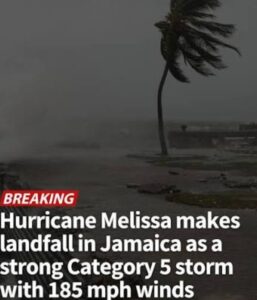By Chris Whilby for Karibbean Vibez Radio Network (KVRN)

Two weeks after Hurricane Melissa tore through Jamaica, the nation’s recovery remains painfully slow. Despite the government’s declared commitment and visible efforts, thousands of citizens who lost their homes are still displaced, and several communities remain unreachable. While natural disasters inevitably test a nation’s resilience, Jamaica’s response to Hurricane Melissa exposes deep systemic weaknesses that demand urgent reform.
A Disorganized and Reactive Response.
The initial governmental response to Hurricane Melissa was, by all indications, inadequate. Reports from affected communities reveal delays in relief distribution, inconsistent communication, and limited coordination between national and local agencies. Emergency shelters were insufficiently supplied, and access to food, clean water, and medical care was uneven across parishes.
While officials worked tirelessly under difficult conditions, the absence of a clear, unified strategy amplified the crisis. This pattern — of slow mobilization and fragmented response — is not new. It has characterized Jamaica’s disaster management approach for decades and points to a larger structural issue: the country’s chronic unpreparedness for large-scale emergencies.
Systemic Weaknesses and Structural Gaps.
Jamaica’s disaster management framework, though well-intentioned, remains largely reactive. The Office of Disaster Preparedness and Emergency Management (ODPEM) and related agencies face persistent challenges, including limited resources, bureaucratic bottlenecks, and unclear chains of command during emergencies.
This systemic fragility reflects a broader governance problem: the absence of a dedicated, proactive institution with both the authority and capacity to coordinate disaster preparation, response, and recovery seamlessly. The existing model relies heavily on crisis response rather than long-term risk reduction.
What Jamaica urgently needs is a comprehensive, proactive disaster management system — one that functions effectively before, during, and after disasters. Such an entity should be empowered to:
Prepare: Implement risk mapping, strengthen infrastructure, stockpile relief supplies, and enforce building codes in vulnerable areas.
Respond: Ensure rapid deployment of personnel, resources, and communication across government levels and regions.
Recover: Manage long-term rehabilitation, housing reconstruction, and socio-economic recovery initiatives.
Without this shift, the nation will remain trapped in a cycle of reactive governance — perpetually responding to crises rather than anticipating them.

Global Best Practices for Disaster Management
Jamaica can draw valuable lessons from international best practices in disaster management. Several countries with similar vulnerabilities have built robust, proactive systems that minimize loss and accelerate recovery:
1. Centralized Disaster Coordination: The United States’ Federal Emergency Management Agency (FEMA) serves as a single coordinating body with clear jurisdiction, ensuring efficiency in both planning and response.
2. Community Empowerment: The Philippines has established local disaster risk reduction councils, training citizens as first responders and decision-makers in their own communities.
3. Technology-Driven Early Warning Systems: Japan and Taiwan utilize advanced data analytics, real-time alerts, and digital mapping to anticipate hazards and mobilize responses swiftly.
4. Stringent Building Codes: Chile’s enforcement of earthquake-resistant construction standards has drastically reduced casualties and infrastructure damage in subsequent disasters.
5. Strategic Stockpiling: Nations like Bangladesh maintain pre-positioned warehouses of essential goods in high-risk areas, enabling immediate relief after disasters.
6. Public Awareness Campaigns: Regular education initiatives in New Zealand and Australia ensure citizens know how to prepare, evacuate, and assist their neighbors during emergencies.
By adapting such practices to Jamaica’s unique context, the country could significantly strengthen its resilience and response capacity.
The Path Forward:
Hurricane Melissa should serve as a wake-up call. While natural disasters are unavoidable, inadequate responses are not. Jamaica must move beyond temporary fixes and adopt a comprehensive, proactive disaster management model — one that integrates preparedness, response, and recovery under a single strategic framework.
This is not merely a matter of efficiency; it is a matter of national security, economic stability, and human dignity. The government’s efforts, though commendable in intent, must now evolve into a long-term, systemic solution.
The time for reaction is over. Jamaica must embrace preparation as its new standard.
